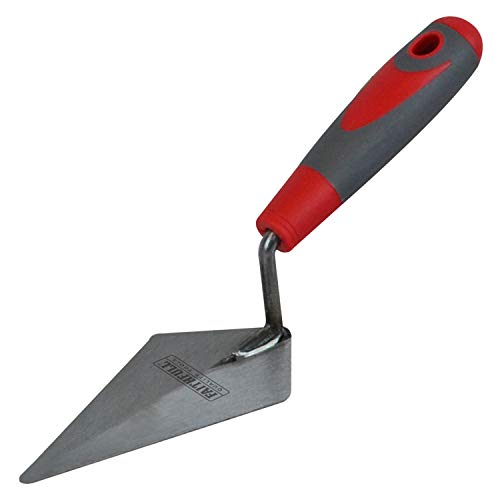Pointing Trowel
A pointing trowel is a small handheld tool with a pointed blade that is used for intricate masonry work, such as pointing or repointing brickwork. The blade of a pointing trowel is usually narrow and measures between 4 to 6 inches in length. It is typically made of sturdy materials like carbon steel or stainless steel to withstand the rigors of masonry work.
Margin Trowel
A margin trowel, also known as an edging trowel, is a versatile hand tool that is used for a variety of tasks, including spreading mortar, applying adhesive, or shaping small amounts of concrete. It has a flat rectangular blade that is typically about 5 to 7 inches long. The blade is often made of steel or tempered carbon, and the handle is usually made of a durable material like hardwood or plastic.
Gauging Trowel
A gauging trowel is a small, specialized trowel that is used for measuring and mixing small quantities of materials like cement or plaster. It has a blade that is typically about 7 inches long and 3 inches wide, with straight edges and a rounded tip. The blade is usually made of stainless steel, which is easy to clean and resistant to corrosion. Gauging trowels are commonly used by masons and plasterers to ensure accurate measurements and smooth mixing of materials.
Brick Trowel
A brick trowel, also known as a bricklayer’s trowel or mason’s trowel, is a must-have tool for any mason or bricklayer. It is designed specifically for spreading and shaping mortar, as well as laying bricks or blocks. The blade of a brick trowel is wide and rectangular, typically measuring around 10 inches in length. It has a sharp point on one end for picking up mortar, and a rounded tip on the other end for spreading and shaping it. The blade is usually made of hardened steel, and the handle is often made of wood or plastic for a comfortable grip.
Pool Trowel
A pool trowel, also known as a finishing trowel, is a specialized tool used for applying a smooth finish to concrete surfaces, particularly in pool construction. It has a curved blade that measures around 14 to 18 inches in length and is made of high-grade stainless steel for durability and resistance to corrosion. The curved shape of the blade allows for easy maneuverability and even distribution of pressure, resulting in a smooth and polished surface. Pool trowels usually have a comfortable handle made of wood, plastic, or rubber for a secure grip.






